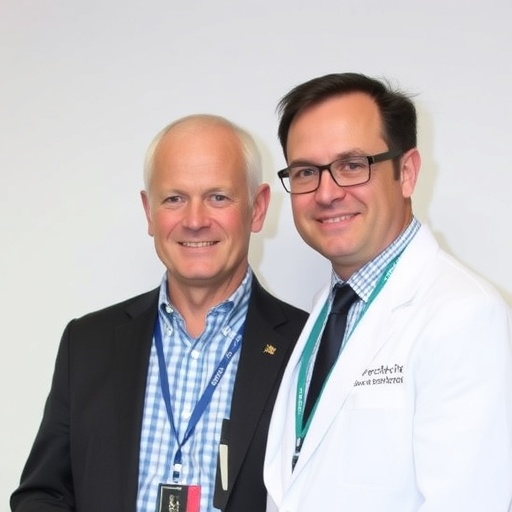In a landmark moment for cardiovascular medicine, the prestigious Andreas Grüntzig Ethica Award will be presented on 22 May 2025 at the Palais des Congrès in Paris, France, celebrating the groundbreaking achievements of Swedish cardiovascular registry experts. Professors Lars Wallentin and Stefan James of the Uppsala Clinical Research Centre, Uppsala University, will receive the award on behalf of an extensive team behind the innovative SWEDEHEART initiative and its interventional subregistry, SCAAR. This honor recognizes their extraordinary contributions to advancing interventional cardiology through pioneering registry-based data collection and research.
The Andreas Grüntzig Ethica Award, recognized as the highest accolade within the interventional cardiology community, applauds those who have significantly contributed to the mission of PCR—to enhance patient outcomes by sharing knowledge, experience, and best practices in cardiovascular interventions. The Swedish registries SWEDEHEART and SCAAR stand at the forefront of these efforts, reflecting decades of data collection coupled with clinical insights that have reshaped cardiac care on a global scale.
SWEDEHEART, which emerged officially in 2009 from the consolidation of four national registries initiated in the 1990s, embodies a comprehensive platform that captures detailed data on every hospitalised patient with acute and chronic cardiovascular diseases in Sweden. Its reach encompasses not only the collection of patient demographics and procedural attributes but also emphasizes continuous quality monitoring. By benchmarking care quality across hospitals within the country, SWEDEHEART has fostered an environment of transparency and ongoing quality improvement that directly benefits patients.
The interventional component, SCAAR, specifically focuses on coronary angiography and percutaneous coronary interventions. Its meticulous data capture spans every procedure undertaken, every patient treated, and every outcome recorded longitudinally. This granular, near-real-time data accumulation has enabled clinicians and researchers to identify trends, evaluate safety and efficacy, and refine clinical protocols to optimize patient care—a rare accomplishment in cardiovascular registries worldwide.
One of SWEDEHEART’s most revolutionary contributions lies in its facilitation of registry-based randomized clinical trials (R-RCTs). This novel hybrid trial design leverages existing registry infrastructure to enrol and follow large patient populations within routine clinical practice, dramatically reducing the time and cost associated with traditional randomized controlled trials. Such pragmatic trials maintain scientific rigor while enhancing generalizability, a methodological evolution that has since been adopted globally, spurring numerous impactful studies.
The extensive dataset housed within SWEDEHEART has spurred over 500 high-impact scientific publications, advancing the understanding of cardiovascular diseases and their management. From dissecting the nuances of acute myocardial infarction interventions to evaluating long-term outcomes of various treatment modalities, these insights have ushered in evidence-based changes in clinical guidelines and practice not only in Sweden but across international borders.
Professor William Wijns, Chair of the PCR Board, underscored the visionary nature of these registries, highlighting their inception long before ‘big data’ became a medical buzzword. The continuous capture and analysis of procedural data linked with clinical outcomes in such an exhaustive manner set new standards for cardiovascular research and quality assurance. These insights have bridged knowledge gaps, informing therapeutic decision-making with unparalleled precision.
Beyond research and quality monitoring, SWEDEHEART exemplifies a crucial bulwark against healthcare disparities. By openly reporting performance metrics, the registry fosters accountability and equity, ensuring that patients across diverse regions receive consistent and effective cardiac care. This systemic transparency has catalyzed improvements in healthcare delivery, reflecting a model for other nations striving toward equitable health systems.
The success of SWEDEHEART has inspired analogous initiatives globally, with national and international registries adopting similar frameworks to harness real-world data for cardiovascular research. This global ripple effect speaks to the foundational work spearheaded by the Swedish teams, whose dedication created a replicable paradigm for integrating data science and clinical practice.
At the upcoming EuroPCR 2025 course, the celebration of this achievement aligns with PCR’s mission to empower the cardiovascular community through education and knowledge exchange. The event, held from 20 to 23 May in Paris, will spotlight innovations such as SWEDEHEART, fostering dialogues on data-driven medicine and its transformative potential in patient care worldwide.
The recognition of Professors Wallentin, James, and their colleagues illustrates the critical role of clinical registries as a nexus between large-scale data collection, rigorous scientific analysis, and real-world clinical application. Their work embodies a synthesis of epidemiology, biostatistics, and interventional cardiology, offering a blueprint for future endeavors aspiring to elevate cardiovascular health outcomes.
As cardiovascular diseases remain a leading cause of morbidity and mortality globally, the insights garnered from SWEDEHEART and SCAAR epitomize how systematic data collection and collaborative research can fuel innovations that save lives. This parsimonious approach leveraging existing clinical workflows minimizes burden while maximizing data utility, a testament to strategic registry design and clinical engagement.
The Andreas Grüntzig Ethica Award thus shines a spotlight not only on individual achievements but also on the collaborative ecosystem propelling cardiovascular medicine into a new era defined by data integration and continuous quality enhancement. It reflects an inspiring narrative where cutting-edge technology and clinical dedication converge to reshape the future of interventional cardiology.
In celebrating this milestone, the global cardiovascular community affirms the indispensable value of registries as instruments for scientific discovery, clinical excellence, and ultimately, patient benefit. As SWEDEHEART continues to evolve, it will undoubtedly remain a beacon of innovation, fostering further advancements and setting standards for how big data can revolutionize cardiovascular care across borders.
Subject of Research: Cardiovascular disease registries and their impact on interventional cardiology and patient care enhancement.
Article Title: Swedish Cardiovascular Registries SWEDEHEART and SCAAR Honored with Andreas Grüntzig Ethica Award for Revolutionizing Interventional Cardiology
News Publication Date: 20 May 2025
Web References:
- EuroPCR Programme: https://www.pcronline.com/Courses/EuroPCR/Programme%C2%A0
- PCR Official Website: http://www.pcronline.com
Keywords: Cardiology, Interventional Cardiology, Cardiovascular Registries, SWEDEHEART, SCAAR, Percutaneous Coronary Intervention, Registry-Based Randomized Trials, Cardiovascular Research, Quality Improvement, Big Data in Medicine




